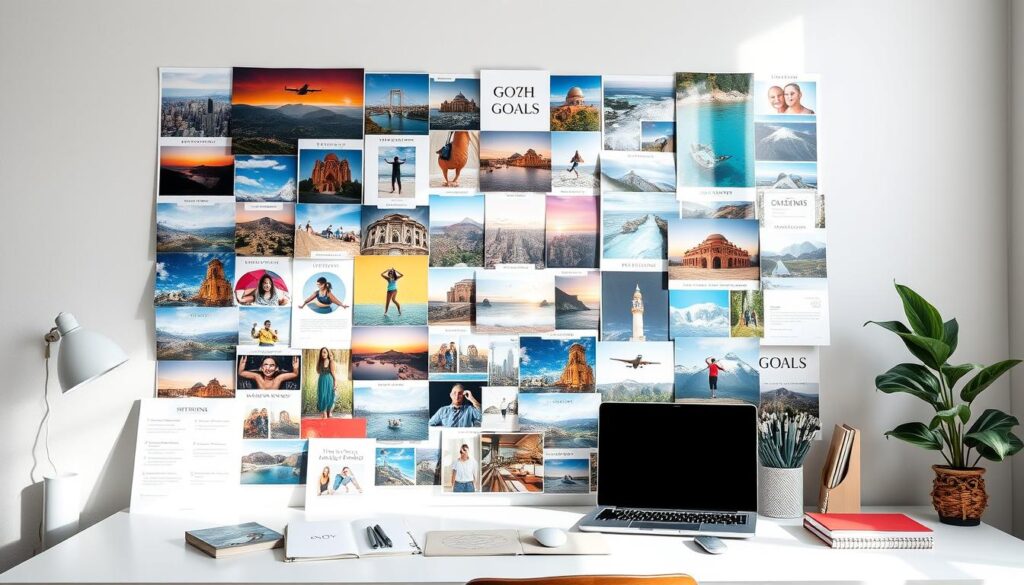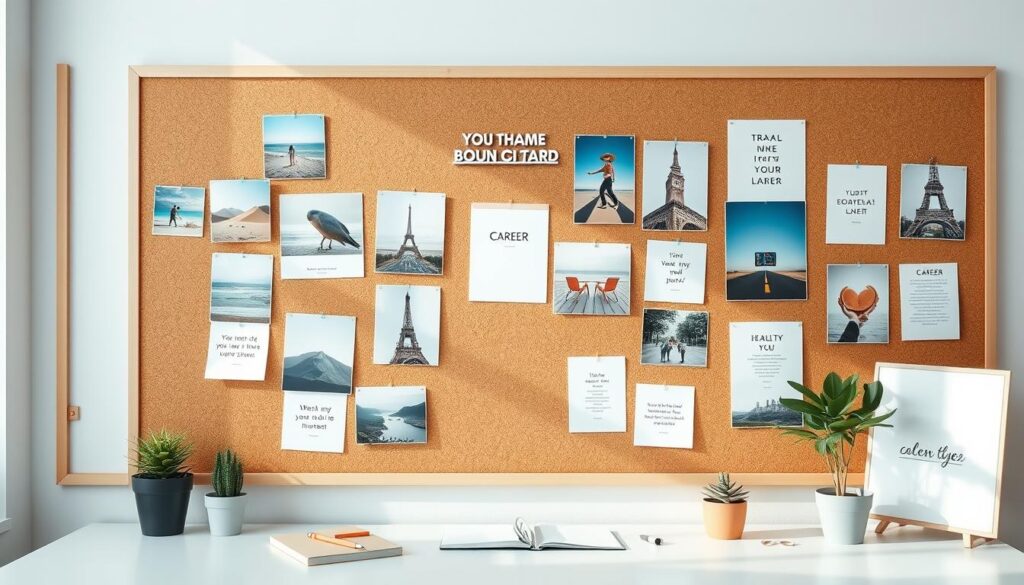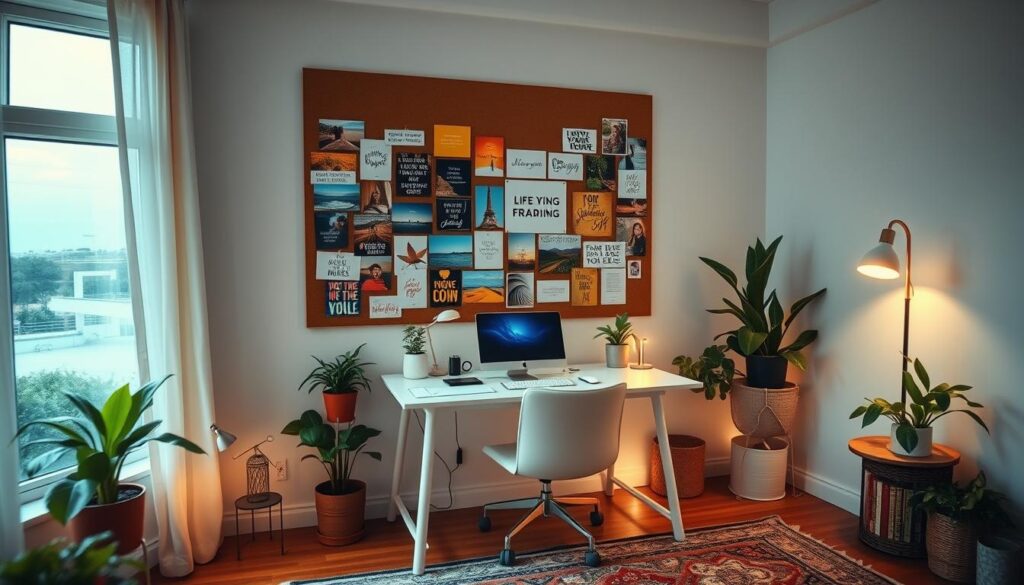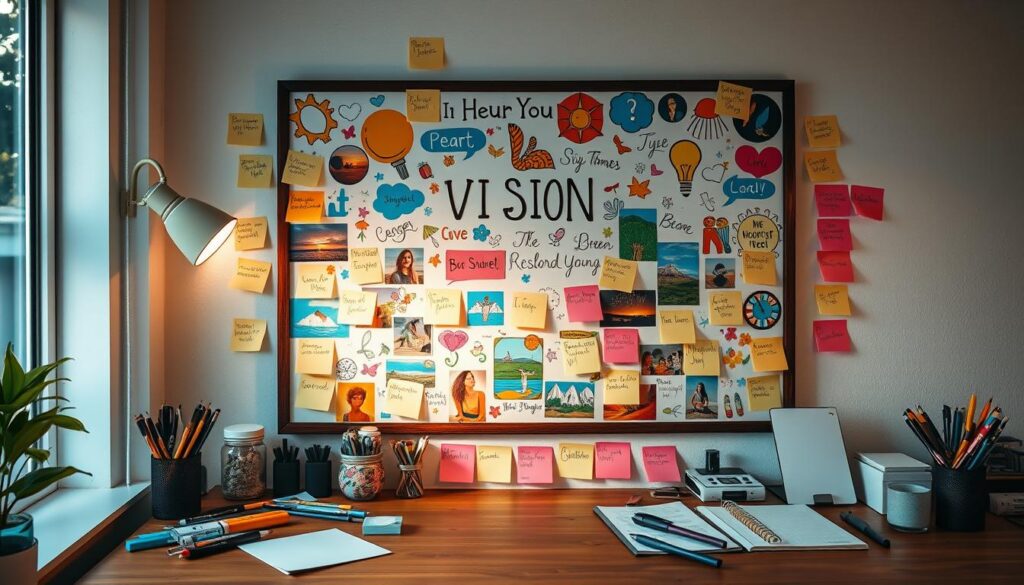Ever made a vision board with big dreams, only to see them fade away? You’re not alone. Many people face vision board errors that block their dreams from coming true.
Vision boarding can change your life, but mistakes can stop you before you start. Knowing these errors is key to making a vision board that leads you to your dreams.
In this guide, we’ll cover the biggest mistakes to avoid in vision boarding. We’ll talk about cluttered designs and unclear goals. You’ll learn how to make a vision board that inspires and motivates you.
Key Takeaways
- Recognize the most common vision board mistakes
- Learn how to create a focused and effective vision board
- Understand the importance of emotional connection in goal setting
- Discover strategies to keep your vision board meaningful
- Develop a proactive approach to manifesting your dreams
Understanding the Purpose of Vision Boarding
Vision boards turn your dreams into clear paths to follow. They help you see your goals in a new way. To make the most of them, you need to know their true power.
Making a vision board is more than just sticking pictures on a board. It’s a way to connect your deepest desires with your life goals. Done right, it can change how you see and feel about your goals.
What Is a Vision Board?
A vision board is a collection of images and words that show what you want for the future. It includes:
- Clear, specific life goals
- Emotionally resonant imagery
- Personal aspirations across different life domains
- Strategic visual representations
Why Vision Boards Matter
Vision boards are not just pretty pictures. They help your brain focus on what you really want. By avoiding common mistakes, you can make a strong plan for success.
“Visualization is daydreaming with a purpose.” – Bo Bennett
How They Can Transform Your Life
Good vision boards do more than just inspire you. They unlock your full ability. By regularly looking at your board, you:
- Clarify your goals
- Increase personal motivation
- Create subconscious alignment
- Develop a proactive mindset
Remember, vision boards are tools, not magic. Your hard work turns these ideas into real achievements.
Common Vision Boarding Mistakes
Creating a vision board seems simple, but many people unknowingly sabotage their own success. Understanding vision board best practices can transform your goal-setting journey and help you avoid common pitfalls.

Focusing Beyond Materialistic Goals
One critical vision board tip is expanding your perspective beyond purely financial objectives. While monetary success matters, true fulfillment encompasses multiple life dimensions.
- Personal growth
- Emotional wellness
- Relationship development
- Spiritual enrichment
Neglecting Regular Board Updates
Vision board advice emphasizes the importance of keeping your board dynamic. Your aspirations evolve, and so should your visual representation.
“A stagnant vision board is like a map that never changes – it won’t guide you to new destinations.”
Creating Realistic, Achievable Goals
Effective vision boards require precise goal setting. Instead of vague statements like “earn more money,” define specific targets that motivate and inspire.
| Vague Goal | Specific Goal |
|---|---|
| Earn more money | Increase income by 20% through professional development |
| Get healthy | Exercise 30 minutes daily, eat balanced meals |
| Travel more | Save $5,000 for international trip to Japan |
Remember, a vision board is a powerful tool for inspiration – but action transforms dreams into reality. Commit to consistent effort and watch your aspirations come to life.
Skipping the Visualization Process
Visualization is key for those who achieve their goals. Many miss out on this powerful tool when making vision boards. It’s about connecting with your goals on a deep level.

Your brain is amazing at achieving goals. By visualizing your dreams, you create paths in your mind. This is more than just daydreaming; it’s a way to make your dreams real.
The Importance of Imagery
Imagery speaks to your subconscious. When picking images for your vision board, think about these things:
- Choose images that make you feel strong emotions
- Pick visuals that clearly show your goals
- Make sure images reflect your own view
- Include images that feel real to your goals
Techniques for Effective Visualization
Getting good at visualization takes practice. Here are some ways to improve your goal setting:
| Technique | Description | Impact |
|---|---|---|
| Mental Rehearsal | Imagine yourself achieving your goals often | Boosts motivation and brain connections |
| Sensory Immersion | Use all your senses in your visualizations | Makes your goals feel more real |
| Daily Reflection | Spend 10-15 minutes each day on visualization | Keeps you focused and committed |
“Visualization is daydreaming with a purpose.” – Bo Bennett
Studies prove that those who visualize their goals are 1.4 times more likely to succeed. By spending time on visualization, your vision board becomes a tool for making your dreams come true.
Lack of Clarity in Your Vision

Creating a vision board is more than just picking pictures. It starts with knowing what truly drives you. Without clear goals, your board is just a mix of images.
Defining Your Core Values
Your vision board should show who you really are. Take time to figure out what’s important to you. Ask yourself these key questions:
- What makes me truly happy?
- What are my non-negotiable life principles?
- What impact do I want to make in the world?
“Clarity is the most important characteristic of goal setting” – Brian Tracy
Specificity in Goal Setting
Setting specific goals turns dreams into doable plans. Instead of saying “I want to be successful,” define what success means to you. Make your goals clear and measurable.
- Quantify your goals
- Set realistic timelines
- Create actionable steps
Studies show people with clear goals are 10 times more likely to reach them. A vision board is powerful when it shows your specific dreams.
Remember: A vision board is not just a wish list—it’s a strategic roadmap to your dreams.
Overcomplicating Your Vision Board

Creating a vision board is a fun journey of self-discovery. But, many people make it too complicated. The secret to a great vision board is keeping it simple and focused.
Keeping It Simple and Focused
When making your vision board, remember that less is more. Clear and simple goals are key. Here are some tips to make your vision board simpler:
- Select 3-5 core goals that truly matter to you
- Choose images that spark genuine emotion
- Eliminate cluttered or distracting elements
- Use white space to create visual breathing room
Using Fewer Images for Greater Impact
Studies show that a simple vision board works better. Only about 6% of people stick to their goals for long. A messy vision board can make it harder to succeed.
“Simplicity is the ultimate sophistication.” – Leonardo da Vinci
A good vision board focuses on quality, not quantity. Choose images that deeply connect with your goals. Each picture should tell a story, evoke strong feelings, or represent a big dream.
By making your vision board simple, you get a powerful tool. It helps you stay focused on your most important goals, ignoring distractions.
Ignoring Emotional Connections
Your vision board is more than just pictures. It’s a tool for emotional vision boarding that can make your dreams come true. The key is to create a visual story that excites and inspires you.

Positive visualization is not just about picking pictures. It’s about choosing images that touch your heart and soul.
The Power of Positive Emotions
Emotions drive us to achieve our goals. Research by Lyubomirsky, King, & Diener (2005) shows that positive emotions help us succeed.
- Choose images that make you feel inspired
- Select visuals that trigger genuine excitement
- Focus on pictures representing your deepest aspirations
How to Choose Images That Resonate
When making your vision board, use these tips for picking powerful images:
| Emotion | Image Selection Criteria |
|---|---|
| Joy | Bright, vibrant images that spark immediate happiness |
| Motivation | Pictures showing achievement and personal growth |
| Inspiration | Images representing your ultimate life goals |
“The most powerful vision boards connect emotion with aspiration.” – Personal Development Expert
Your vision board should show your heart’s dreams. By choosing images that touch your emotions, you turn a simple poster into a powerful tool for making your dreams real.
Choosing the Wrong Location for Your Board
Your vision board’s placement is key to its success. It’s not just about where you hang it. It’s about creating a spot that sparks inspiration every day.

The right spot turns your vision board into a powerful motivator. It’s about picking a place where you see your goals often. This makes your board a daily reminder of your goals.
The Significance of Placement
Studies show that seeing your goals often boosts your motivation. Place your board where you see it every day. This could be near your bed, desk, or phone.
- Bedroom wall near your mirror
- Home office workspace
- Digital background on personal devices
- Near your morning coffee preparation area
Ideal Spots for Daily Inspiration
Here are the best places for your board:
| Location | Visibility Score | Daily Interaction |
|---|---|---|
| Bedroom Wall | High | Morning/Evening |
| Home Office | Medium-High | Work Hours |
| Phone Wallpaper | Very High | Constant |
“Your environment shapes your mindset. Choose a vision board location that continuously reinforces your dreams.” – Personal Development Expert
Pro tip: Change your board’s spot now and then. This keeps your mind fresh and inspired. Your brain loves new things, so keep your board’s location interesting.
Not Engaging with Your Board Regularly
Creating a vision board is just the first step. The real magic happens through consistent daily interaction and goal reflection habits. These habits transform your aspirations into reality.

Millions of coaches worldwide endorse vision boards as powerful manifestation tools. Your board isn’t meant to collect dust. It’s a dynamic roadmap to your dreams that requires regular attention.
Making It a Daily Habit
Developing a consistent visualization practice can dramatically enhance your goal achievement. Consider these strategies for daily vision board review:
- Review your board first thing in the morning to set intentional energy
- Spend 5-10 minutes before bed reconnecting with your visual goals
- Create a dedicated space where your board is easily visible
“Visualization is daydreaming with a purpose” – Bo Bennett
Setting Reminders for Reflection
Technology can help support your goal reflection habits. Use smartphone apps or digital calendars to prompt daily vision board engagement. The brain’s “value-tagging” mechanism responds powerfully to consistent visual reinforcement.
Neuroscientific research suggests that regular interaction with your vision board desensitizes your brain to challenges. This reduces fear responses and increases motivation toward your goals.
Pro tip: Consider creating a portable vision card you can carry as a constant reminder of your aspirations.
Underestimating the Importance of Affirmations
Vision board affirmations are powerful tools that turn your dreams into real goals. They fuel your motivation and change your subconscious thoughts.

Positive self-talk is key to a success mindset. By adding goal-oriented affirmations to your vision board, you’re setting your mind up for success.
Crafting Effective Affirmations
To make strong affirmations, follow these steps:
- Use present-tense language
- Keep statements positive and specific
- Align affirmations with your core values
- Make them personally meaningful
“Your thoughts shape your reality. Choose them wisely.” – Unknown
Incorporating Affirmations into Your Board
Make your vision board a powerful motivator by placing affirmations wisely. Here are some tips:
- Write affirmations near images that match them
- Use bold, inspiring fonts
- Place statements where they’ll catch your eye
| Affirmation Type | Purpose | Impact |
|---|---|---|
| Career Growth | Professional Development | Increased Confidence |
| Personal Wellness | Health Improvement | Positive Mindset |
| Financial Success | Wealth Manifestation | Abundance Thinking |
Studies reveal that 79% of professionals feel more positive after using vision boards. By adding thoughtful affirmations, you’re not just showing your goals. You’re changing your brain for success.
Failing to Track Your Progress
![]()
Starting a vision board is just the first step. Tracking your progress is key to reaching your dreams. It’s not just about checking off goals. It’s about seeing how you’ve grown.
The Importance of Reflection
Reaching your goals needs regular self-reflection. Your vision board is a living guide, not just a picture. Reflection helps you:
- See your achievements
- Understand your growth
- Spot areas to improve
- Stay motivated by seeing your progress
“The unexamined goal is not worth pursuing.” – Personal Development Wisdom
Adjusting Your Goals as Needed
Changing your goals is vital in your growth journey. As you change, your vision board should too. Use digital tools or journals to track your progress well.
Oprah Winfrey shows the power of tracking your vision board. She set big goals and tracked her progress closely. Adjusting your goals can turn your vision board into a powerful tool for planning your life.
- Review your board monthly
- Celebrate small wins
- Update images for current goals
- Stay open to new approaches
A vision board is a living document of your dreams. Embrace reflection as a key to personal growth and ongoing improvement.
Forgetting to Celebrate Achievements
Your vision board journey is more than just setting goals. It’s about recognizing your personal growth and celebrating every milestone. Research shows that acknowledging achievements can boost motivation by an incredible 65%. This makes it key to celebrate your vision board success as you progress.
Acknowledging progress isn’t just about grand achievements. Small wins matter a lot. By taking time to recognize your efforts, you trigger the release of dopamine. This neurotransmitter enhances motivation and learning. Sadly, 43% of individuals overlook celebrating their accomplishments, which can slow down your growth.
Recognizing Your Progress
Your vision board is a powerful tool for tracking personal development. When you achieve a goal, pause and reflect on how far you’ve come. Sharing your success stories can increase motivation within your social circle by 30%. This creates a positive ripple effect that inspires not just yourself but those around you.
Encouraging Continuous Growth
Celebrating achievements isn’t about perfection—it’s about progress. By embracing each milestone, you reduce stress and build confidence. Remember, your vision board is a living document that evolves with you. Update it, reflect on your journey, and keep pushing forward with renewed energy and enthusiasm.
FAQ
What exactly is a vision board?
A vision board is a visual tool for your goals and dreams. It uses images, words, and affirmations to focus your mind on what you want. This helps your subconscious mind stay on track with your goals.
How often should I update my vision board?
Update your vision board every six months or when your life changes. As you grow, your goals change too. Your vision board should show your current dreams and goals.
Can a vision board really help me achieve my goals?
A vision board isn’t magic, but it’s very helpful. It makes your goals real and keeps you motivated. By looking at it often, you focus your mind on what you want to achieve.
What are the most common mistakes to avoid when creating a vision board?
Don’t just focus on money or make a messy board. Make sure it feels real to you and is simple. Regularly look at it to keep your goals in mind.
Where is the best location to place my vision board?
Put your vision board where you see it every day. Good spots are your bedroom, office, or fridge. Seeing it often helps keep your goals in mind.
How specific should my vision board goals be?
Make your goals clear and specific. Instead of “get healthy,” say “run a 5K by September.” Specific goals help your mind focus better.
Do I need to be artistic to create an effective vision board?
No, you don’t need to be artistic. What matters is that your board shows your true goals. Choose images and words that inspire you.
How long should I spend working on my vision board?
It’s not about how long you work on it, but how well you do it. Take your time to pick meaningful images and goals. Daily use is more important than making it.
Can digital vision boards be as effective as physical ones?
Yes, digital boards can be just as good. They work best if you see them often. Choose a format that you’ll use and enjoy every day.
How do I know if my vision board is working?
Success is about growing and staying motivated. Track your progress and celebrate small wins. Seeing your mindset and actions align with your goals shows it’s working.
Source Links
- Why Vision Boards Fail? Avoid 7 Common Mistakes That Others Make! – https://www.evelynlim.com/why-vision-boards-fail-avoid-7-common-mistakes-that-others-make/
- Avoid These Common Vision Board Mistakes – Surpass Your Goals – https://www.surpassyourgoals.com/2020/12/avoid-these-common-vision-board-mistakes/
- Vision Board Do’s and Don’ts to Prep for My Vision Board Book Launch! — Louloudi Skincare & Apothecary – https://www.louloudiskincare.com/journal/vision-board-dos-and-donts-to-prep-for-my-vision-board-book-launch
- Here’s Why Your Vision Board May Not Work – https://medium.com/business-rebels/heres-why-your-vision-board-may-not-work-3179088b45ba
- Common Vision Board Mistakes and how to Avoid Them – Blogs by Aria – https://www.blogsbyaria.com/2020/01/vision-board-mistakes/
- 5 Vision Board Mistakes That Stop You Manifesting – https://selfmadeladies.com/vision-board-mistakes/
- Vision Board Mistakes: 6 Common Board Errors to Avoid – https://dreammakerr.com/vision-board-mistakes/
- Vision Boards and Visualization. Can They Change Your Life? – https://www.linkedin.com/pulse/vision-boards-visualization-can-change-your-life-sandy-peckinpah-
- Visualizing Success: How to Make a Vision Board for Work – https://www.linkedin.com/pulse/visualizing-success-how-make-vision-board-work-teambonding-m78he
- The Power Of Visualization: How Vision Board Can Transform Your Life – https://drneetikaushik.com/manifestation/the-power-of-visualization-how-vision-board-can-transform-your-life/
- What is vision board creations? – Focuskeeper Glossary – https://focuskeeper.co/glossary/what-is-vision-board-creations/
- 7 Visualization Mistakes to Avoid for Faster Manifestation – Manifest Your Dream Life: Alignment, Manifestation Techniques & Powerful Intentions|MANIFESTESIA – https://manifestesia.com/7-visualization-mistakes-to-avoid-for-faster-manifestation/
- 7+ Goal Setting Mistakes to Avoid in 2024: Boost Your Success! – https://eliasbehrens.com/goal-setting-mistakes/
- Vision Boarding: Ideas, Examples, Supplies, and More – https://www.berkeleywellbeing.com/vision-board.html
- Tunnel Vision – Its Drawbacks and How to Stay Clear of it – https://managemagazine.com/article-bank/self-handicapping-leadership/tunnel-vision-its-drawbacks-and-how-to-stay-clear-of-it/
- What Are Some Common Mistakes To Avoid In A Voice Acting Workshop? – https://dev.asburyseminary.edu/manual/what-are-some-common-mistakes-to-avoid-in-a-voice-acting-wor-ey0d.html
- 7 Vision Boarding Mistakes to Avoid – https://www.linkedin.com/pulse/7-vision-boarding-mistakes-avoid-dianne-glavaš-zb8cc
- Vision Boards – A Practical Guide to Achieving Your Goals – Caroline Kay – https://carolinekay.co/2023/12/14/vision-boards/
- How to create a vision board template [Works Fast]? – https://affine.pro/blog/how-to-create-a-vision-board-template
- Creating A Vision Board For Future Goals | Visualising And Planning For Personal Growth In 5-Step – https://www.lungisasonqishe.com/creating-a-vision-board-for-goals/
- 111 Vision Board Affirmations To Inspire You – https://projecthotmess.com/vision-board-affirmations/
- Enhance your life with applied positive psychology – https://lpsonline.sas.upenn.edu/features/enhance-your-life-applied-positive-psychology
- How To Make a Vision Board That Really Works – Guide & Vision Board Ideas – https://cleverfoxplanner.com/blogs/articles/how-to-make-a-vision-board-that-really-works-guide-vision-board-ideas
- How do you track the success of your vision and strategy? – https://www.linkedin.com/advice/0/how-do-you-track-success-your-vision-strategy-skills-leadership
- Why is it important to celebrate your achievements? – Rest Less – https://restless.co.uk/health/healthy-mind/why-is-it-important-to-celebrate-your-achievements/
- Celebrate Success- rewarding reaching your goal. – Moving Mindsets – https://www.movingmindsets.com.au/celebrate-success-rewarding-reaching-goal/
